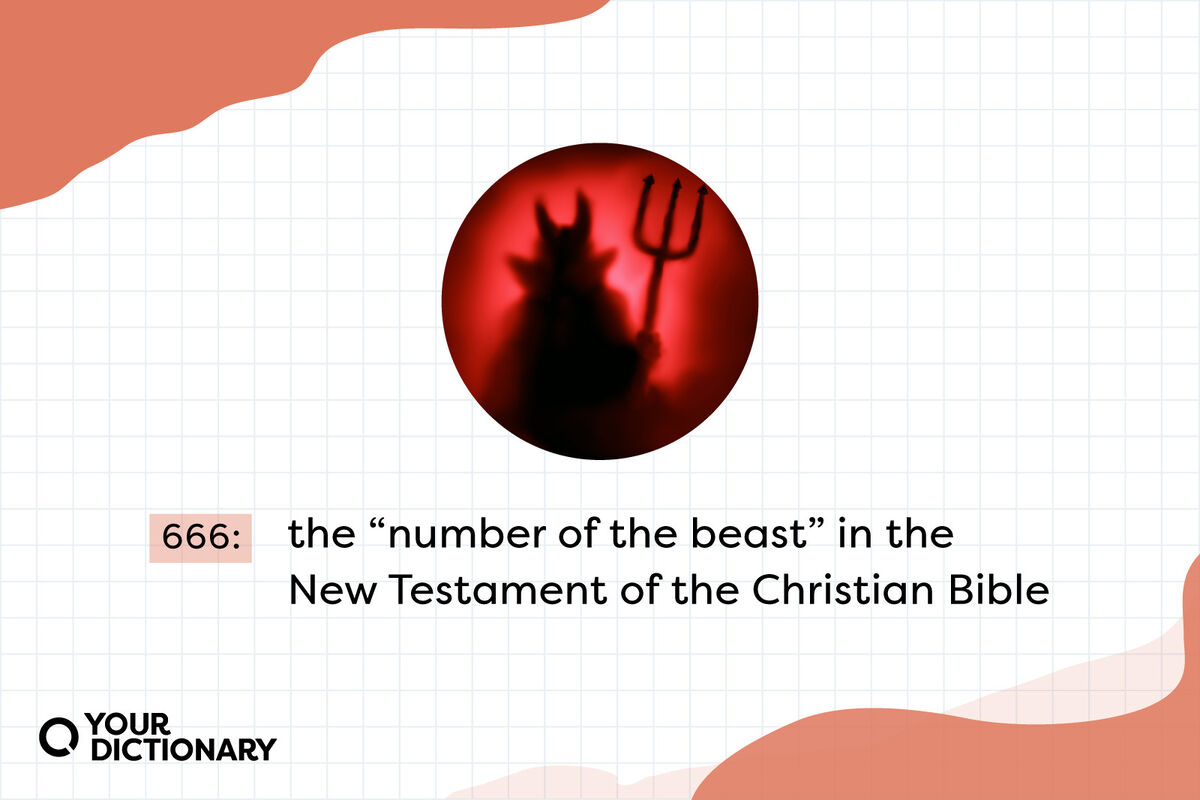
“That’ll be $6.66,” says the cashier, and a shiver goes down your spine. Why do we find the number 666 so spooky and unlucky? There’s a reason — but depending on your interpretation, it may not be as compelling as the cool mathematical qualities of 666.
Biblical Meaning of 666: The Number of the Beast
The number 666 is known as the “number of the beast” in the New Testament of the Christian Bible. The Book of Revelation (13:15-18) states that 666 is the mark of a beast who will arrive in the End Times:
The second beast was given power to give breath to the image of the first beast, so that the image could speak and cause all who refused to worship the image to be killed. It also forced all people, great and small, rich and poor, free and slave, to receive a mark on their right hands or on their foreheads, so that they could not buy or sell unless they had the mark, which is the name of the beast or the number of its name.
This calls for wisdom. Let the person who has insight calculate the number of the beast, for it is the number of a man. That number is 666. (NIV)
666 is also known as the “false trinity” or the “unholy trinity” that consists of Satan, the Antichrist (a charismatic, powerful person) and the False Prophet (someone who claims to speak for God, but doesn’t). Basically, the Bible finds the number 666 to be bad news all around.
Historical Interpretation of 666
Taken in historical context, however, 666 has a different purpose. Some historians believe that the Book of Revelations, which was written by John the Elder around A.D. 96, and the symbols listed therein are not a warning of a real, snarling beast but of the political control of the Roman Empire.
In this interpretation, the Beast would be the Roman Emperor, who Christians saw as a ruthless leader. Other symbols throughout the Book of Revelations would refer to other aspects of the Empire itself (including 666 as the Emperor’s “mark” on Roman coins).
If you support this interpretation, 666 is no longer a cursed, demonic number, but a symbol of political protest. But don’t paint it on your protest sign just yet — more often than not, people see the number as a bad omen.
Mathematically, 666 Is a Cool Number
Despite its religious and historical reputation, the number 666 has some uniquely interesting qualities. For one, its presence can create a beastly palindromic prime — a prime number that has 666 in the middle and reads the same forward and backward.
In addition, 666 is:
-
the sum of all numbers on a roulette wheel
-
the sum of the squares of the first seven prime numbers
-
the sum and difference of the first three 6th powers (16 - 26 + 36)
-
the sum of the first 144 digits of pi
-
the sum of the first six Roman numerals from largest to smallest (DCLXVI)
-
part of Belphegor’s Prime (13 zeroes with 666 in the middle: 1,000,000,000,000,066,600,000,000,000,001), named after one of the seven princes of Hell
Other Devilish Appearances in Your Vocabulary
If 666 still gives you the heebie-jeebies, think about how many times you mention the devil on a daily basis. These devil-themed idioms are so common that you probably don’t even notice them anymore.
-
a devil of a time - a very difficult time
-
better the devil you know - choosing a bad situation over a potentially worse situation because you’re already familiar with it
-
catch the devil (or catch hell) - to get in trouble
-
devil’s advocate - someone who attacks an idea for the sake of identifying its weaknesses
-
devil-may-care attitude - a carefree, unconcerned outlook
-
dine with the devil - to knowingly take part in wrongdoing
-
selling your soul to the devil - to make an unethical deal in order to get what you want
-
speak of the devil, and in he walks - to talk about a person just as they approach you
-
the devil to pay - a lot of trouble
-
the devil with you - I’m finished arguing with you
Math and Writing: A Match Made in Heaven?
Symbolism is important in both religion and writing. Find more fascinating number symbols in other facts about the Bible, and discover why some of these symbols may differ between Judaism and Christianity, for example. If you're actually more intrigued by numbers, satisfy your inner math nerd with math puns better than Pi itself!